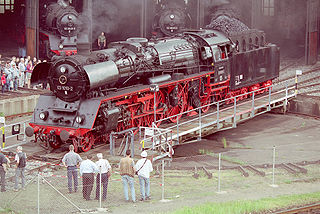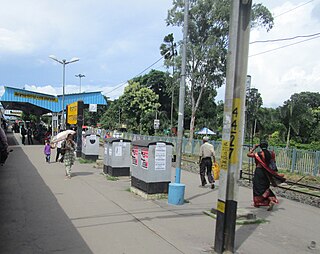
The motive power depot is the place where locomotives are usually housed, repaired and maintained when not being used. They were originally known as "running sheds", "engine sheds" or, for short, just sheds. Facilities are provided for refuelling and replenishing water, lubricating oil and grease and, for steam engines, disposal of the ash. There are often workshops for day to day repairs and maintenance, although locomotive building and major overhauls are usually carried out in the locomotive works.
The railways in Germany use several abbreviations to differentiate between various types of stations, stops, railway facilities and other places of rail service.
The East Town Railway Workshops were a major manufacturing, maintenance and repair facility of the New Zealand Railways Department (NZR) located by the Marton - New Plymouth Line in the city of Wanganui in New Zealand's North Island. Output included not only rolling stock but also tools, equipment, huts, furniture and tarpaulins. It was a prodigious facility, and one of the larger employers in the city. Its name is sometimes formatted as Eastown or Easttown.
Otahuhu Railway Workshops were a major rolling stock construction, maintenance and repair facility operated by the New Zealand Railways Department (NZR), in the south Auckland suburb of Otahuhu in New Zealand's North Island. The workshops were opened in 1928 and were closed in 1992 as part of a rationalisation of workshop facilities throughout the country.

The Darmstadt-Kranichstein Railway Museum a railway museum in the German city of Darmstadt. It is also the largest railway museum in the state of Hesse.

The German Class 03.10 engines were standard steam locomotives (Einheitsdampflokomotiven) belonging to the Deutsche Reichsbahn and designed for hauling express trains.
The Meiningen Steam Locomotive Works is a railway repair shop in Meiningen, Germany. It is owned by Deutsche Bahn and has specialised in the maintenance of museum steam locomotives since 1990, having extensive experience in maintaining steam engines. Today, customers of the factory include railway museums and museum railways from all over Europe. The factory is responsible for the safety inspections of all operational German steam locomotives.
The Lokomotiv-Versuchsamt Grunewald or LVA was a facility established from 1920 to 1945 at Berlin-Grunewald in Germany that conducted trials on railway vehicles. The office used the facilities of the railway repair shop (Ausbesserungswerk) at Grunewald on the Berlin Stadtbahn southwest of Berlin's Westkreuz station.

An Ausbesserungswerk is a railway facility in German-speaking countries, the primary function of which is the repair of railway vehicles or their components. It is thus equivalent to a 'repair shop' or 'works'. It is also referred to as a Centralwerkstatt or Zentralwerkstatt or Hauptwerkstatt. During the Deutsche Reichsbahn-Gesellschaft (DRG) period between the two world wars these facilities were called Reichsbahnausbesserungswerke (RAW).

A Bahnbetriebswerk is the equivalent of a locomotive depot on the German and Austrian railways. It is an installation that carries out the maintenance, minor repairs, refuelling and cleaning of locomotives and other motive power. In addition it organises the deployment of locomotives and crews. In the Deutsche Bahn, a Bahnbetriebswerk is known today as a Betriebshof; the ÖBB refer to it as a Zugförderungsstelle (Zf). Many other countries simply use the term 'depot'. The smaller facility, the Lokomotivstation akin to the British sub-depot or stabling point, is affiliated to a Bahnbetriebswerk.

The DB Museum in Koblenz was opened on 21 April 2001 as the first remote site of the Nuremberg Transport Museum. It is run by volunteer workers as part of the Stiftung Bahn-Sozialwerk (BSW), a kind of railway workers social service organisation, and has its origins in a BSW's 'Group for the Preservation of Historical Railway Vehicles' at Koblenz.
The Central Organisation For Modernisation of Workshops (COFMOW) is a public sector undertaking in India, created in 1979 to modernise the workshops of Indian Railways. It was established through funding from the World Bank and is located in New Delhi, the national capital.

The Kulturhalle Zenith is an events hall located in the Schwabing-Freimann borough of Munich, Germany. Originally opening in 1918 as a part of a railway repair shop, the hall was converted into performance venue in 1994. Since its opening in August 1996, it has hosted concerts, fairs and company presentations.

Pesa is a Polish company manufacturing railway vehicles based in Bydgoszcz. The name 'Pesa' derives from the initials PS which stand for Pojazdy Szynowe, 'railway vehicles' in Polish. Pesa is a successor to the Bydgoszcz repair shops of PKP Polskie Koleje Państwowe, Polish State Railways. From the 1950s until 1998 the repair shops operated under the name ZNTK Bydgoszcz, Zakłady Naprawcze Taboru Kolejowego, 'Repair Shop for Railway Rolling Stock' in Bydgoszcz.

Koblenz-Lützel station is the oldest still-operating station in the city of Koblenz in the German state of Rhineland-Palatinate. It was built at the same time as the Koblenz Rhenish station, which was abandoned in 1902 with the opening of the Koblenz Central Station (Hautptbahnhof) and destroyed in World War II.

The Carriage Repair Workshop, Harnaut provides bogie maintenance services for India's East Central Railway. According to Indian Railways's rules, coaches require preventive maintenance every eighteen months. The facility employs 1,000 and handles fifty units each month.

Krefeld-Oppum is a station in the city of Krefeld in the German state of North Rhine-Westphalia on the Duisburg-Ruhrort–Mönchengladbach railway. It consists of a passenger station, a railway repair shop, where Intercity-Express trains are also serviced, and a former freight yard.
Anton Joachimsthaler is a German historian. He is particularly noted for his research on the early life of the German dictator Adolf Hitler, in his book Korrektur einer Biografie and his last days in the book Hitlers Ende, published in English as The Last Days of Hitler.

Kanchrapara railway station is a Kolkata Suburban Railway station in Kanchrapara on the Sealdah–Ranaghat line. It is situated in North 24 Parganas district, on the outskirts of Kolkata in the state of West Bengal, India. It mainly serves the Greater Kanchrapara town region and the surrounding areas. This is a considerably important station on the Sealdah–Ranaghat line because of the existence of the Kanchrapara Railway Workshop. There were plans of making this crowded station a junction stop, but this has not been initiated yet, mainly due to the less space available to expand the station. The distance between Sealdah railway station and Kanchrapara station is about 45 km.

Kanchrapara Workshop Gate railway station is a railway station on the Sealdah Ranagahat line. Only during office peak hours trains halt here. This station has been mainly built for the workers of the Kanchrapara Railway Workshop.














